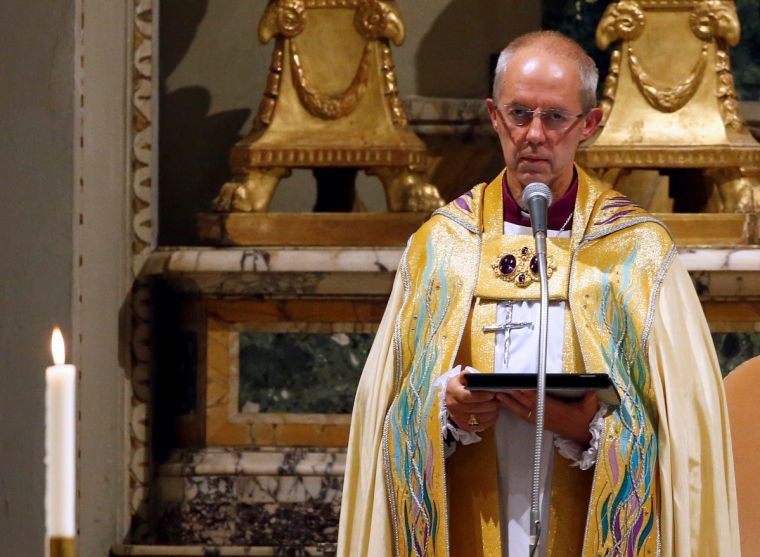Justin Welby: Christianity Is Threatened As Never Before In Middle East

Christianity has never felt so threatened as it does now in its historic birthplace of the Middle East, the Archbishop of Canterbury has warned.
Christians have recently been on the receiving end of persecution both from militantly atheist and religiously intolerant regimes, Justin Welby said today.
"It would not be over-stating matters to say that Christianity is both the numerically largest faith and the most persecuted.
"The historic centre of the Christian Church in the Middle East has never felt so threatened, but is also under attack in countries as diverse as North Korea and Eritrea, where Christians are harassed, imprisoned, persecuted and killed."
Sixty eight years after the United Nations agreed the Universal Declaration of Human Rights, this situation is intolerable, he said.
"As faith communities we must step up and hold governments to account. This is a challenge for us all everywhere but none-more-so than in countries where faith communities have serious power through numerical, political or civic strength."
In the UK, he added, the Church of England is at the fore in advocating the rights of Muslims to set up schools, madrassahs and mosques across the country.
"But the increasing integration of Muslim communities within British society, in which we rejoice, is in stark contrast to the increasing marginalisation of and outright hostility to Christian communities within many parts of the world, not least in significant parts of the Middle East."
The Archbishop of Canterbury also condemned the definition of British values given by Ofsted, Britain's education inspectorate, as a recipe for tyrrany.
Welby was addressing the "Council of the Wise" in Abu Dhabi, where Christian worship is allowed to flourish and grow, unlike other Muslim-majority Middle Eastern countries.
The council was debating integration and religious freedom.
Welby said: "In the UK we find British values, so called, defined by Ofsted as belief in democracy, in the rule of law and in mutual respect of faiths, or for those of no faith.
"This approach is good, but entirely inadequate as a foundation for a healthy society. Democracy without fundamental values around the value of the human being, and, I would say, without the understanding of God's grace and love for the humanity God created, is a recipe for majority tyranny."
The two-day event was organised by the Muslim Council of Elders and included Christian leaders from the Anglican Communion.
Welby described the world as "beset by a crisis of confidence" in the rights it pledged to uphold in the aftermath of the Second World War.
"The crisis is affecting all faith groups, deepening nationalist tensions, and leaking across from the approach to faith into the most acute challenges to international law, human flourishing and stability."
He said the crisis had given "permission" for those in political campaigns to condemn all Muslims, or other groups they dislike, and compared this to the pre-war mood in Hitler's Nazi Germany.
"The impact of such tyranny was seen in the 1930s, when the law enacted by democratically elected government began the process of the holocaust.
"Six million Jewish people were to be systematically slaughtered and millions more displaced in the most brutal antithesis of religious freedom."
In Christian tradition, he said, it is understood that an evil society makes it very hard for individuals within it to live well.
"This truth about the need for a righteous society has led and still leads many churches to advocate law as about morality, because bad morality leads to bad societies."
He warned: "There is a real danger of societies legislating against their ideological opponents through fear and ending up compromising their own moral and spiritual integrity by committing acts of evil against the very people they thought they were protecting the rest of society from."
Dr. Edward Kessler, founder-director of the Woolf Institute based in Cambridge, told Christian Today: "Christianity has been part of the essential fabric of the Middle East for two thousand years. Far from being a Western import as some, now seem to suggest, Christian communities have been intrinsic to the development of Arab culture and civilisation.
"This central role is why it is abhorrent to see Christianity and Christians under assault across the Middle East. Specifically this impact on people is shocking but also will mean Christianity will be lost from its birthplace, destroying the richness of the tapestry of the Middle East.
"The importance of interfaith dialogue in the Middle East cannot be understated. It is only through dialogue, knowledge and understanding built between faiths that these issues can be overcome and the heritage of the Middle East can be not only preserved but for diversity to continue to flourish."











